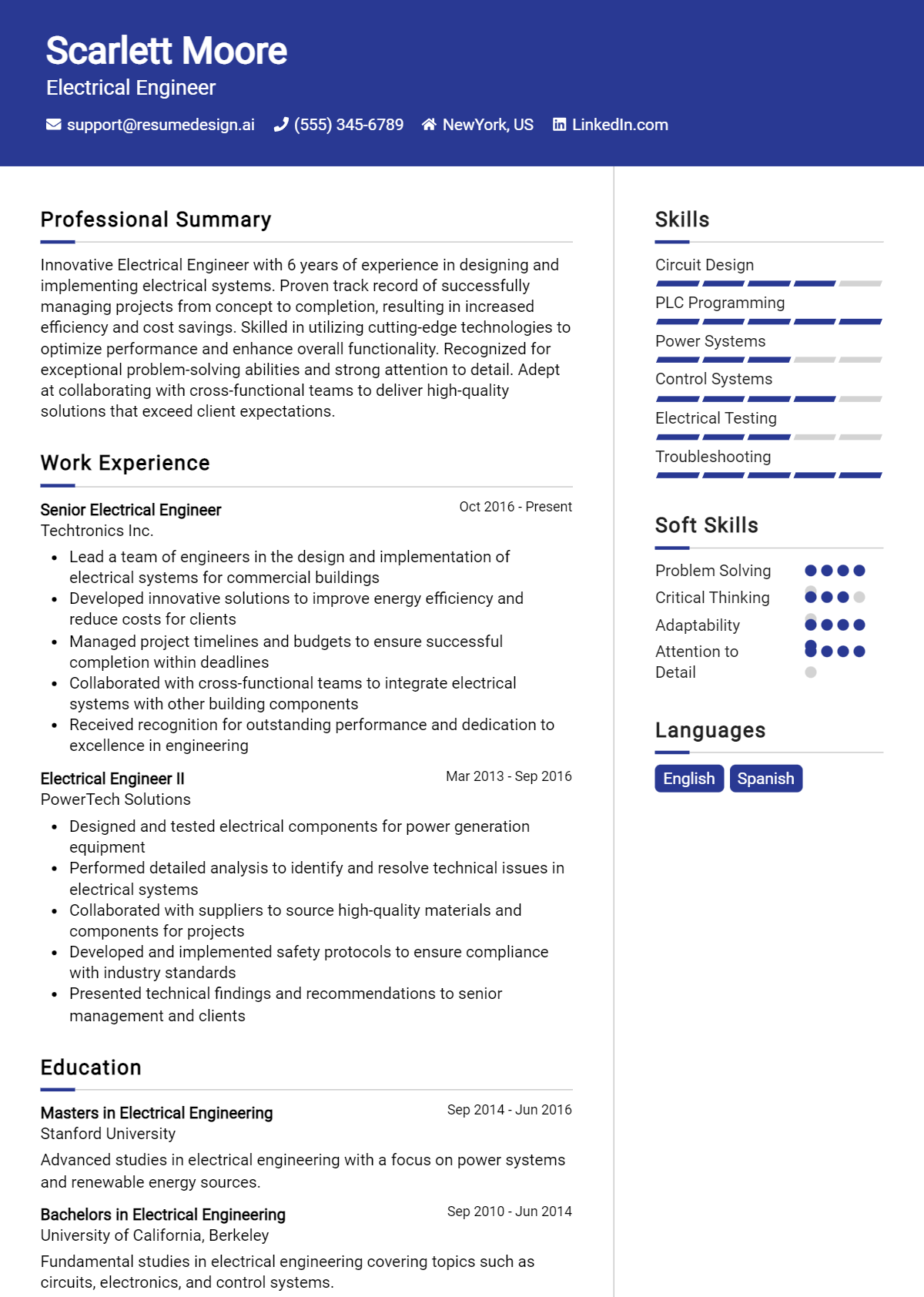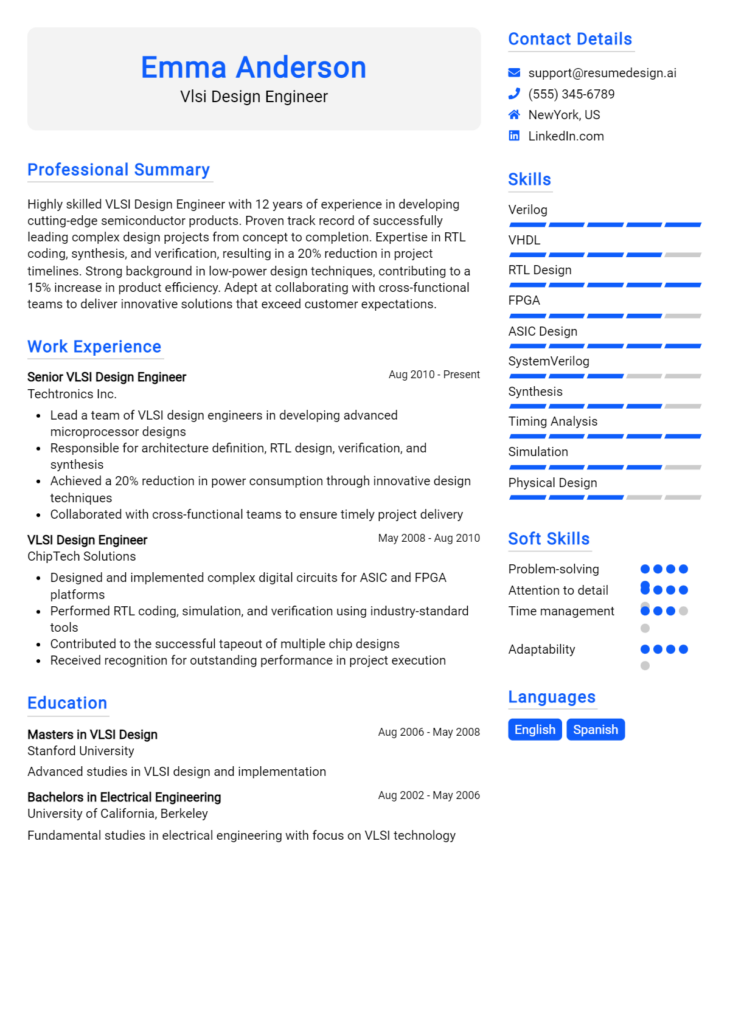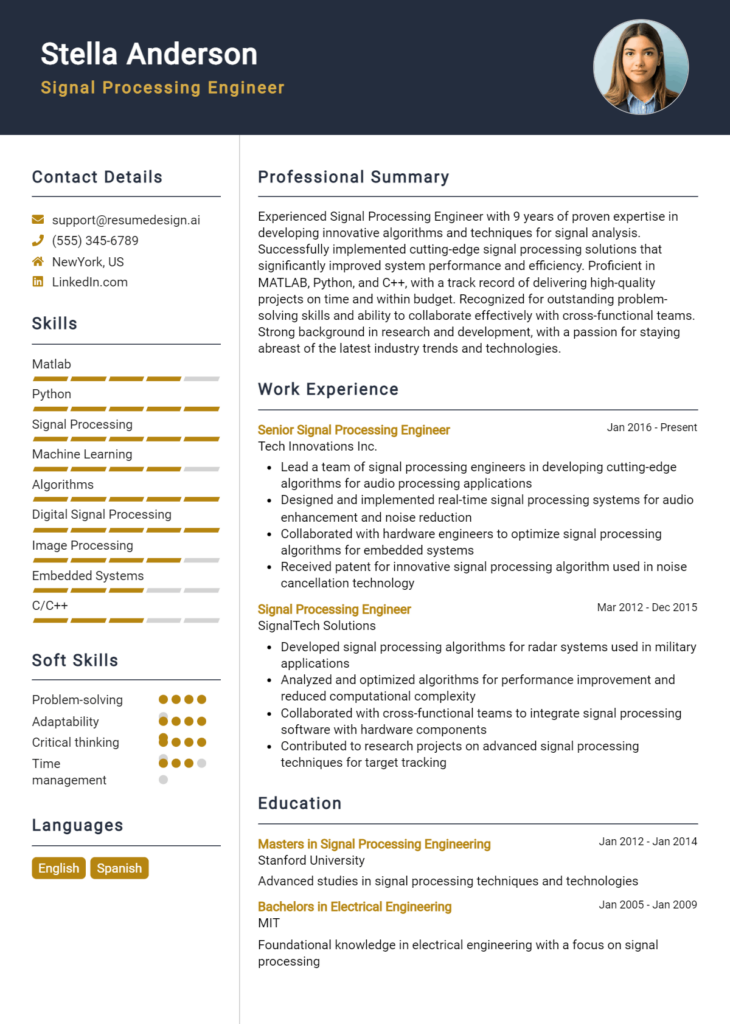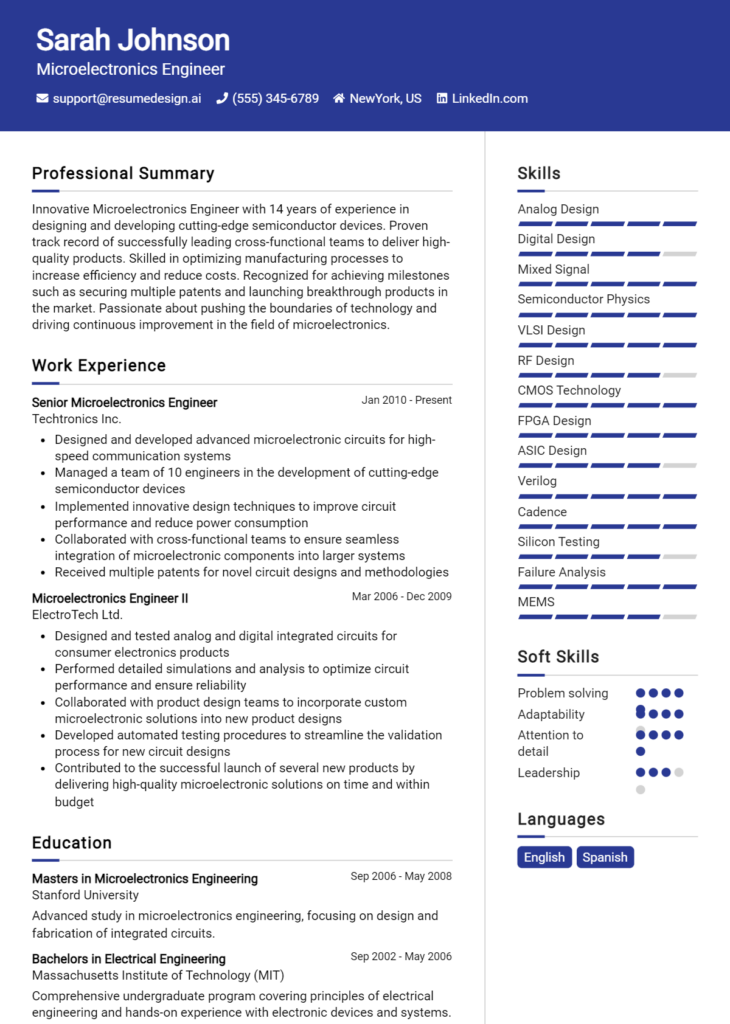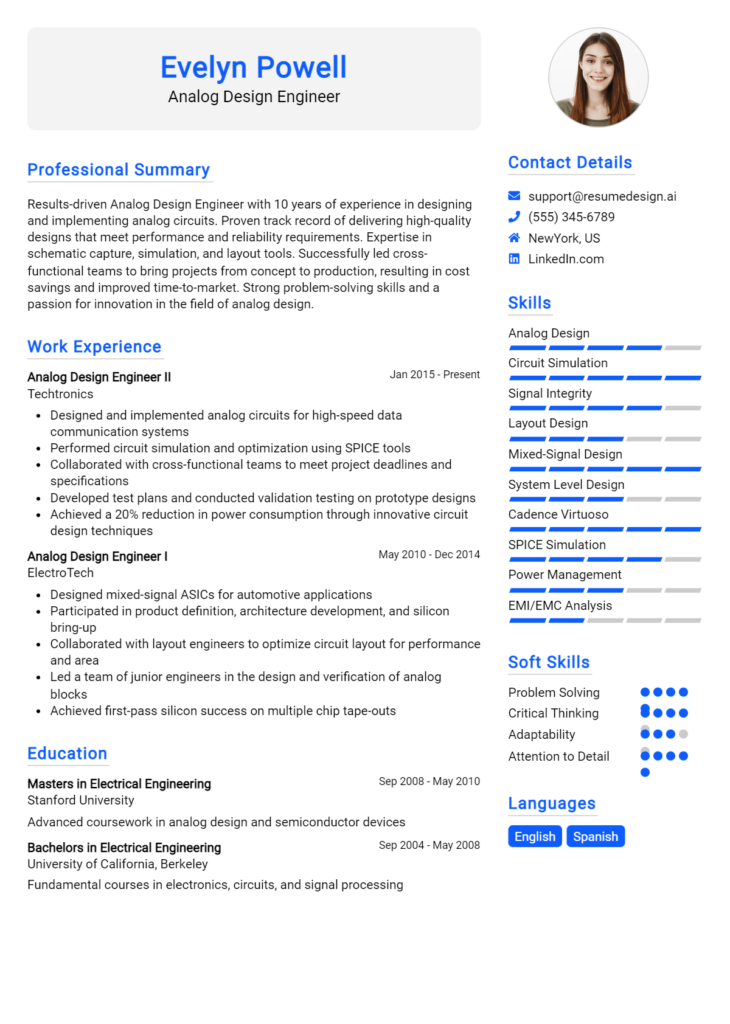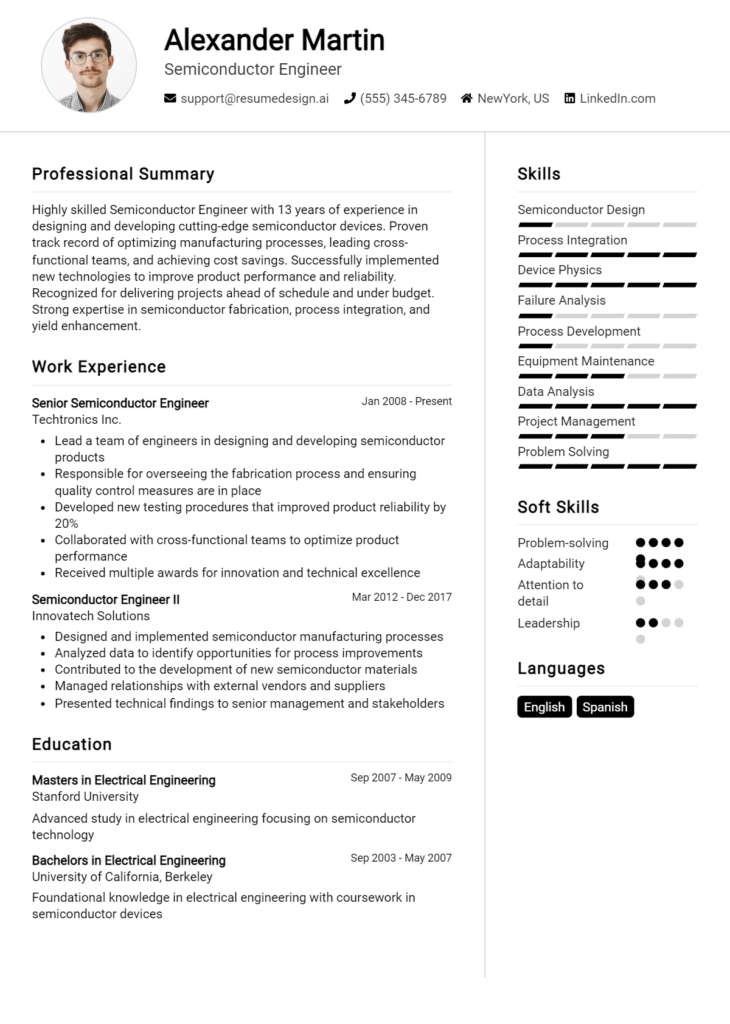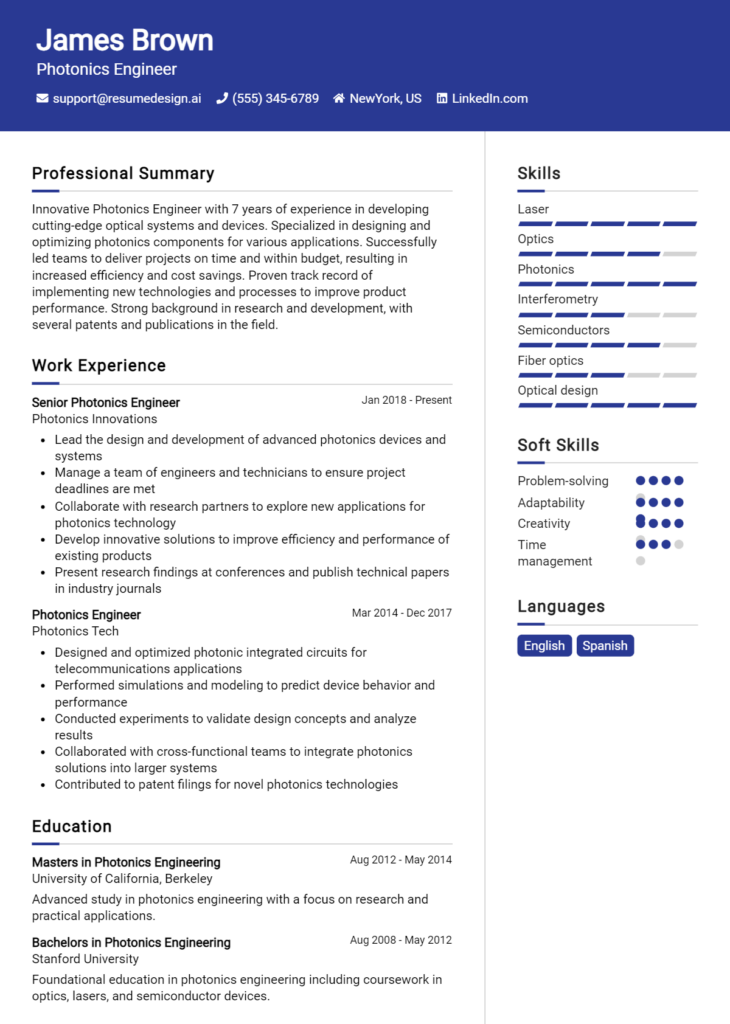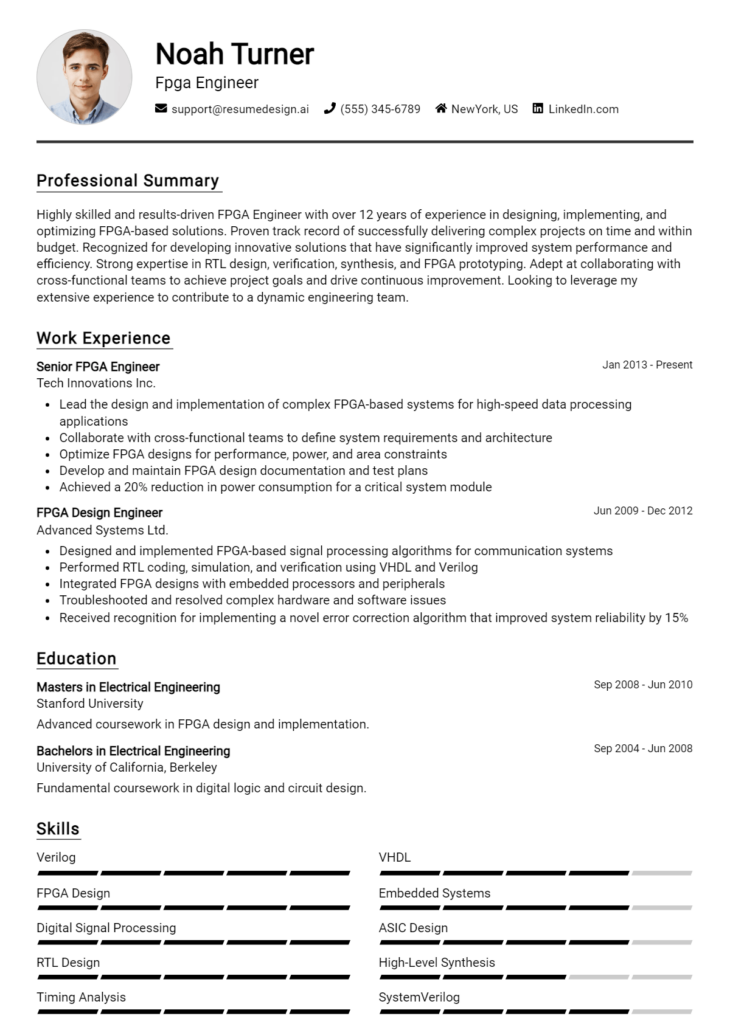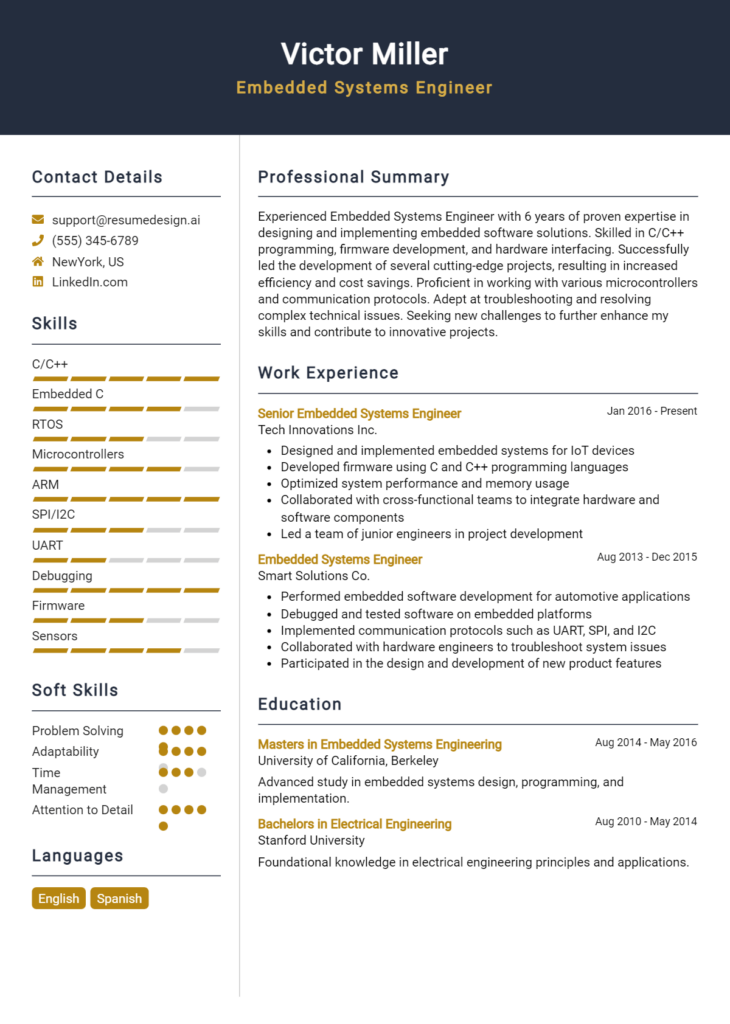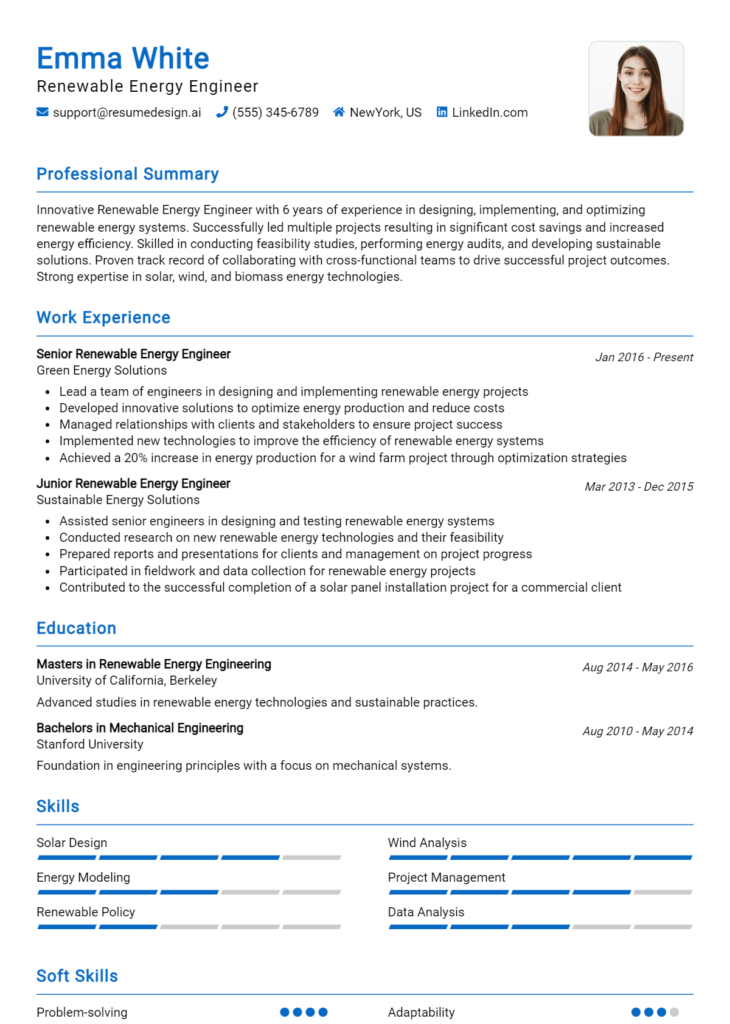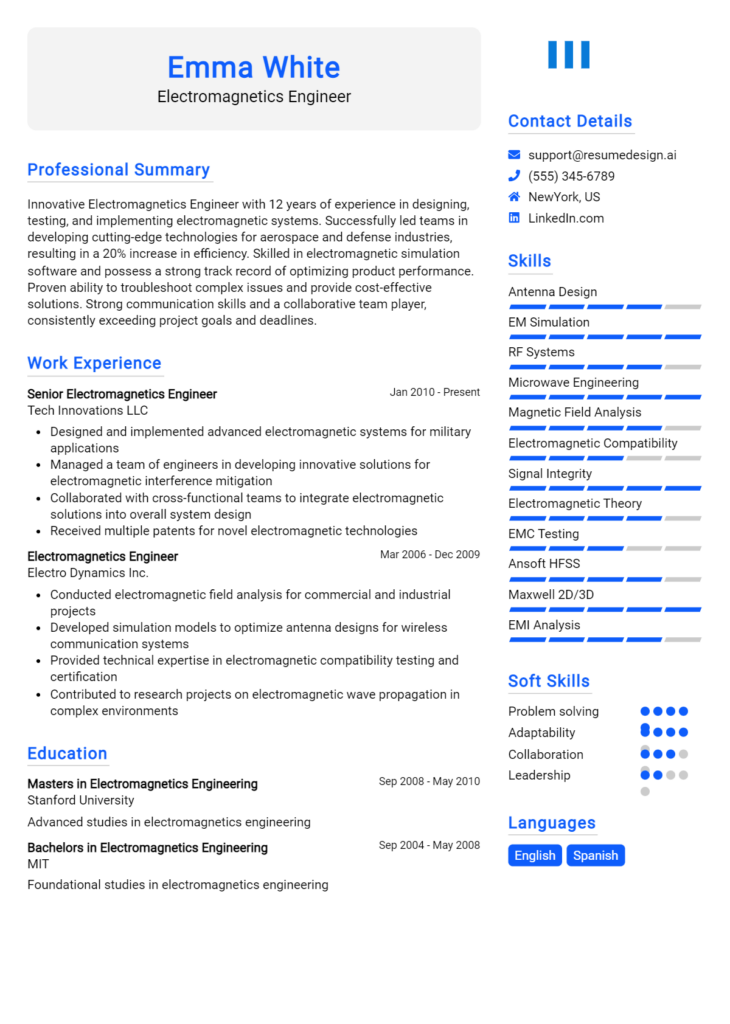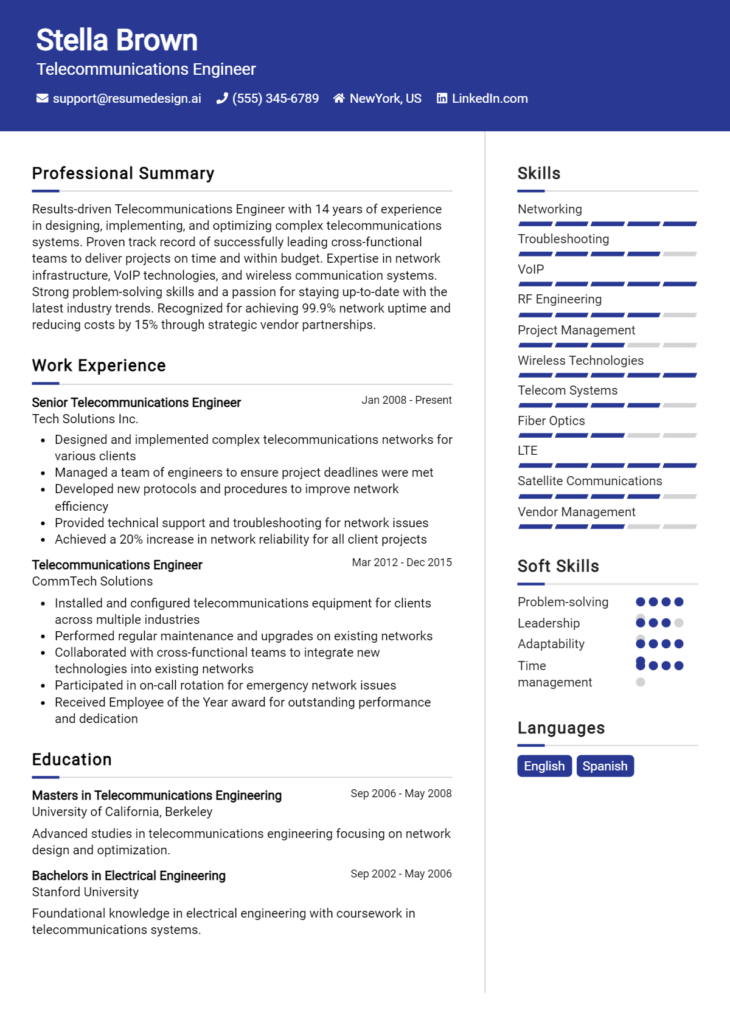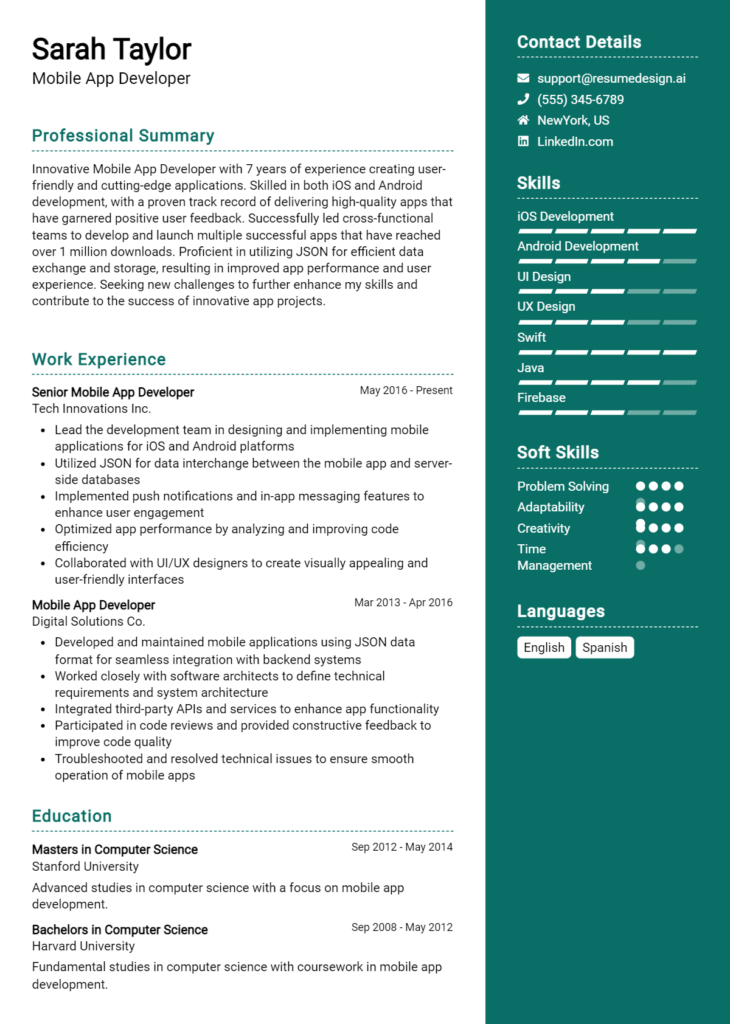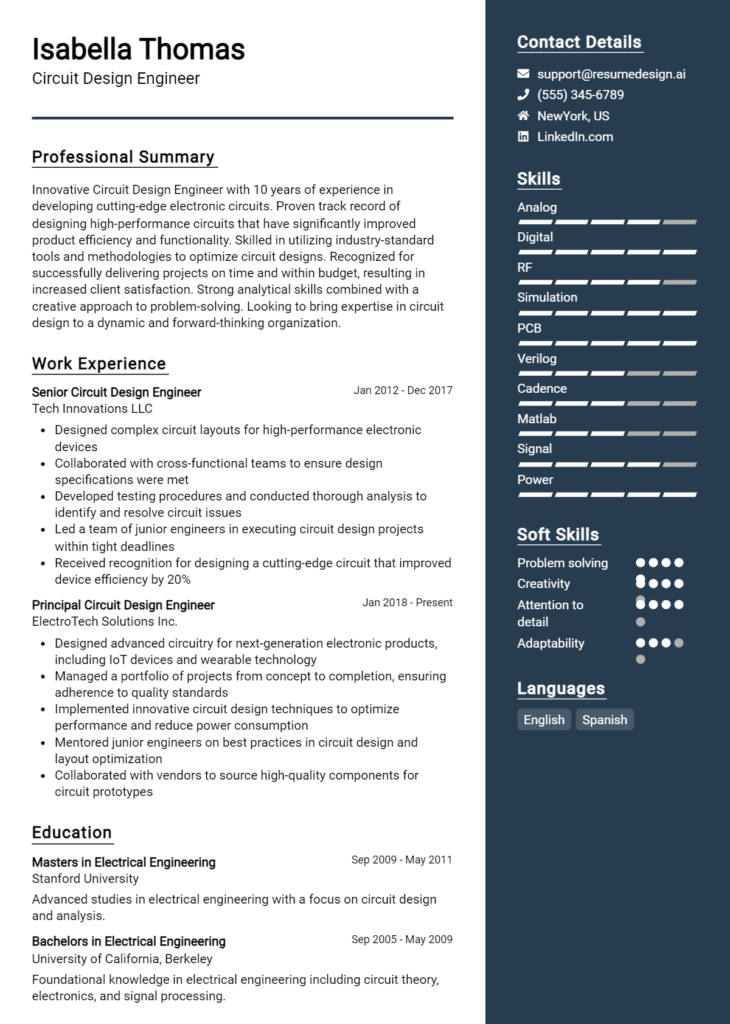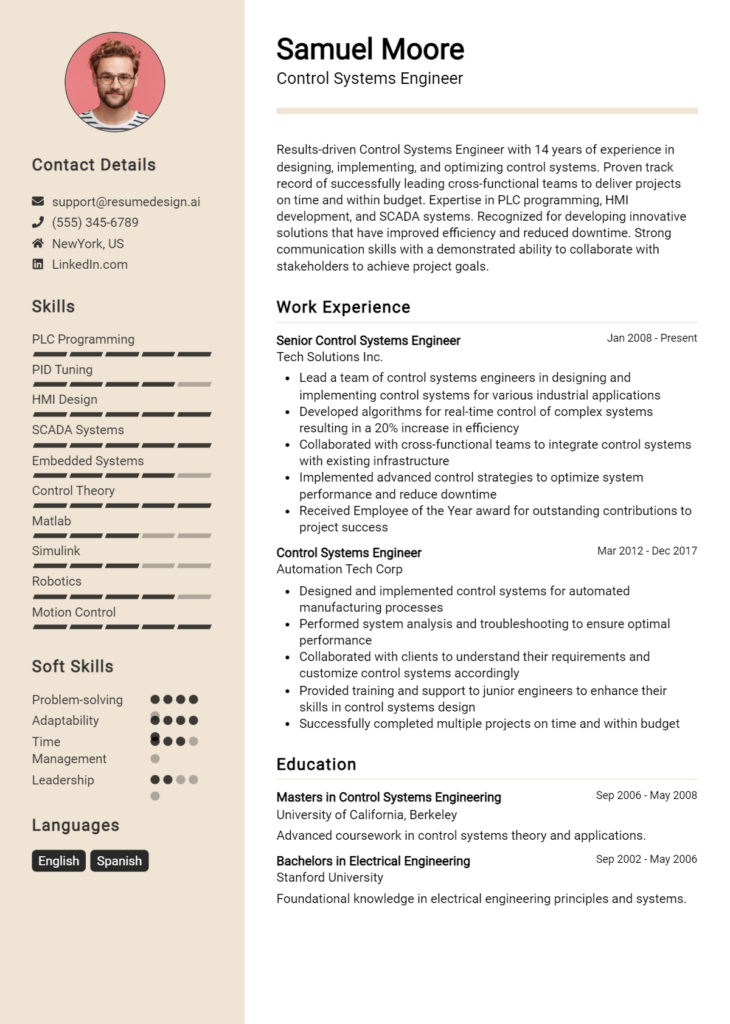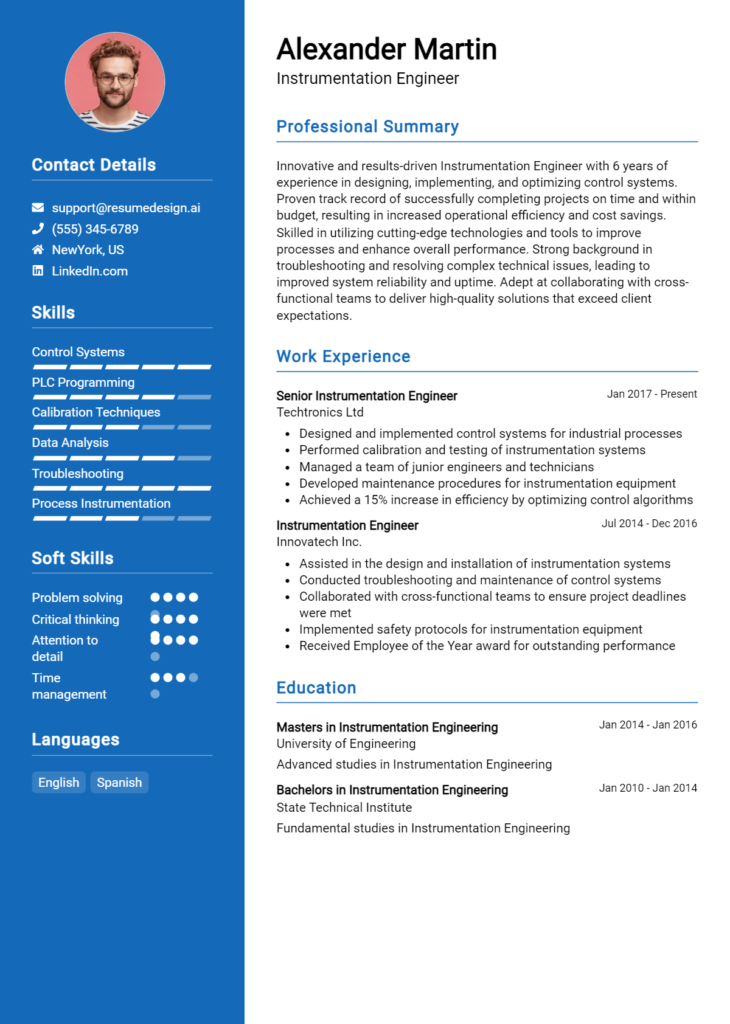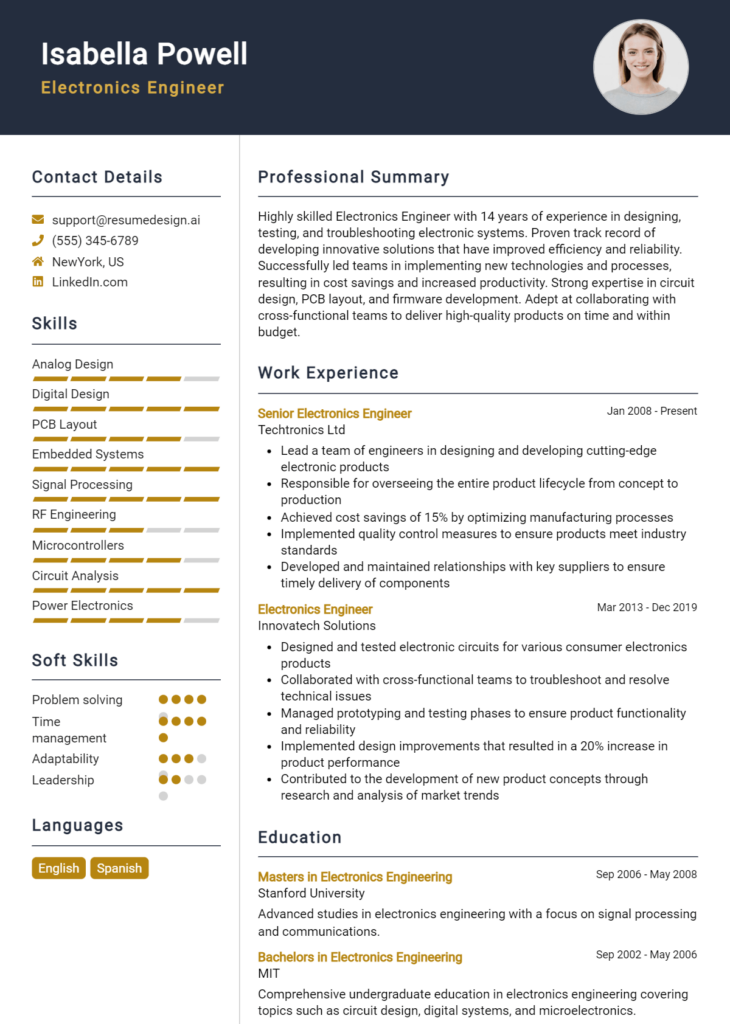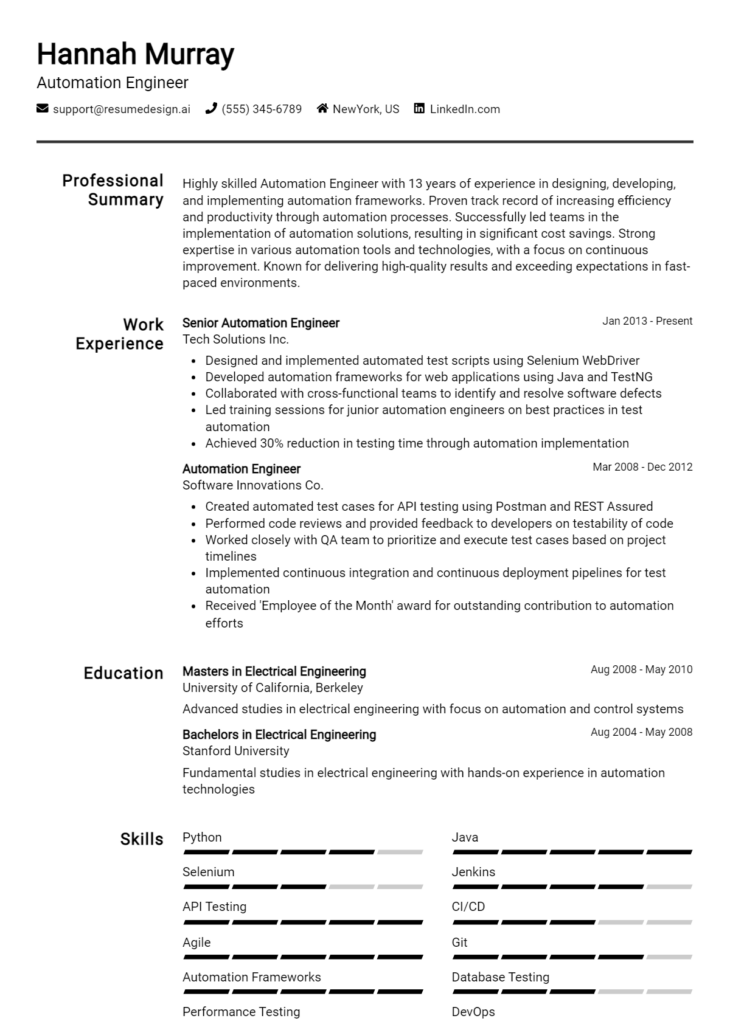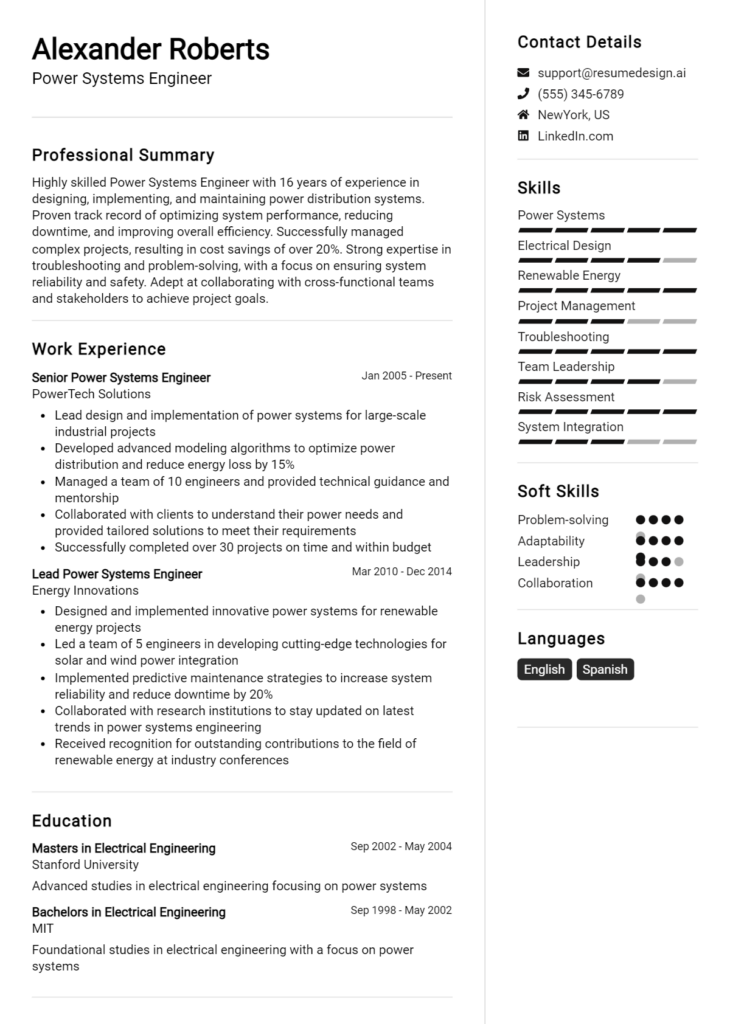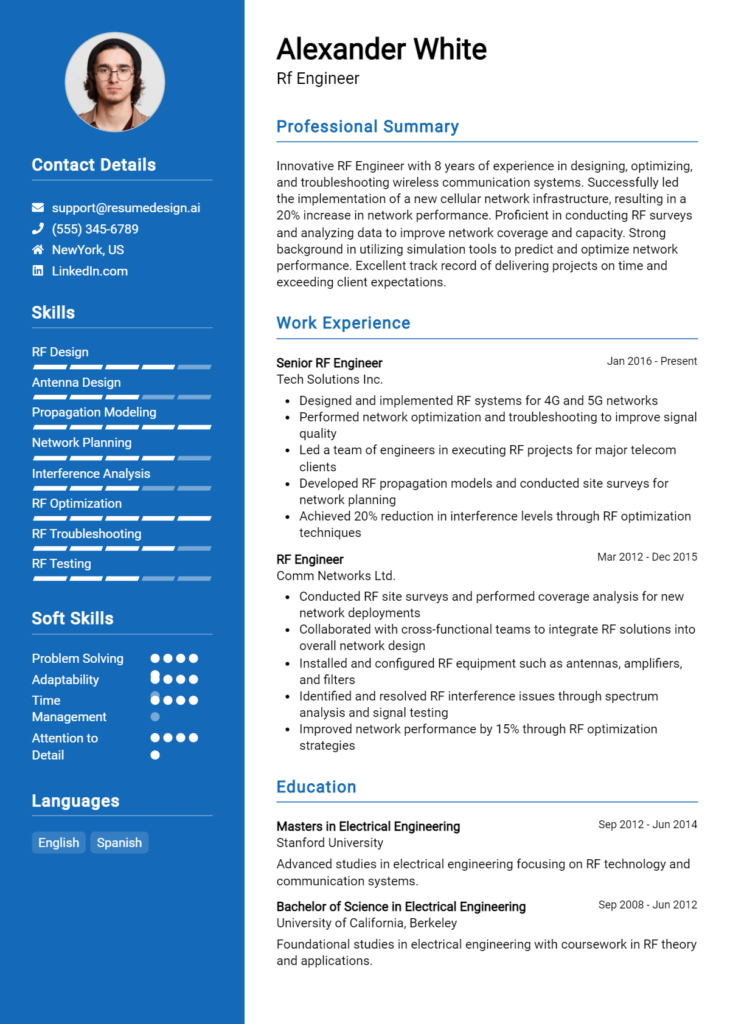Electrical Engineer Core Responsibilities
Electrical Engineers play a crucial role in designing, developing, and maintaining electrical systems and components, requiring strong technical, operational, and problem-solving skills. They collaborate across departments, ensuring that projects align with organizational goals while addressing technical challenges. Proficiency in software tools, circuit design, and project management is essential for success. A well-structured resume highlighting these skills not only demonstrates expertise but also showcases the engineer's ability to contribute effectively to team dynamics and project outcomes.
Common Responsibilities Listed on Electrical Engineer Resume
- Design and develop electrical systems and components.
- Conduct feasibility studies and cost analysis.
- Collaborate with cross-functional teams for project execution.
- Perform troubleshooting and problem-solving on electrical systems.
- Ensure compliance with industry standards and regulations.
- Prepare technical documentation and reports.
- Manage project timelines and budgets.
- Test and validate electrical prototypes and systems.
- Implement improvements to enhance system performance.
- Provide technical support and training to team members.
- Stay updated with emerging technologies and industry trends.
High-Level Resume Tips for Electrical Engineer Professionals
In the competitive field of electrical engineering, a well-crafted resume serves as a critical tool for making a strong first impression on potential employers. Your resume is often the first glimpse hiring managers get of your professional capabilities, and it needs to effectively showcase your skills, achievements, and relevant experience. A strong resume not only highlights your qualifications but also demonstrates your ability to contribute to a company's success. This guide will provide practical and actionable resume tips specifically tailored for Electrical Engineer professionals, ensuring that your application stands out in the crowded job market.
Top Resume Tips for Electrical Engineer Professionals
- Tailor your resume to the job description by incorporating keywords and phrases used in the posting.
- Highlight relevant experience, focusing on projects, internships, or roles that relate directly to the position you’re applying for.
- Quantify your achievements with specific metrics, such as percentages or dollar amounts, to demonstrate the impact of your work.
- Include industry-specific skills, such as proficiency in software tools like MATLAB, AutoCAD, or PSpice.
- Utilize a clean and professional format that enhances readability and ensures key information stands out.
- Showcase your certifications and licenses, such as EIT or PE, as they can significantly bolster your credibility.
- Incorporate a summary statement at the top of your resume that succinctly captures your professional profile and career objectives.
- List relevant coursework or projects that demonstrate your expertise in specialized areas like power systems or electronics.
- Keep your resume concise, ideally one page, while ensuring it contains all critical information and accomplishments.
By implementing these tips, you can significantly enhance your resume and increase your chances of landing a job in the Electrical Engineer field. A well-structured and targeted resume not only reflects your skills and experiences but also positions you as a strong candidate who understands the industry's demands. Take the time to craft a resume that effectively showcases your value, and you’ll be one step closer to achieving your career goals.
Why Resume Headlines & Titles are Important for Electrical Engineer
In the competitive field of electrical engineering, resume headlines and titles play a crucial role in capturing the attention of hiring managers. A strong headline or title serves as a powerful first impression, summarizing a candidate's key qualifications and expertise in one impactful phrase. This concise statement not only provides clarity about the applicant's professional identity but also emphasizes their relevant skills and experiences directly related to the job being applied for. By effectively distilling complex qualifications into a few words, a well-crafted headline can significantly enhance a resume's visibility and attract the interest of potential employers.
Best Practices for Crafting Resume Headlines for Electrical Engineer
- Keep it concise: Aim for a headline that is clear and to the point, ideally no more than 10 words.
- Be specific: Tailor the headline to reflect the specific electrical engineering role you are applying for.
- Highlight key skills: Include relevant skills or technologies that are in demand for the position.
- Use action-oriented language: Start with strong action verbs that convey your expertise and achievements.
- Incorporate industry keywords: Use terminology that resonates with the electrical engineering field to improve searchability.
- Showcase achievements: If possible, include quantifiable accomplishments that set you apart from other candidates.
- Reflect your unique value: Emphasize what makes you a unique candidate worthy of consideration.
- Keep it professional: Ensure the tone and language are appropriate for the industry standards.
Example Resume Headlines for Electrical Engineer
Strong Resume Headlines
Innovative Electrical Engineer with 5+ Years in Renewable Energy Solutions
Results-Driven Electrical Engineer Specializing in Power Systems Design
Experienced Electrical Engineer with Expertise in Circuit Design and Analysis
Dynamic Electrical Engineer Focused on IoT Applications and Smart Technologies
Weak Resume Headlines
Electrical Engineer Looking for a Job
Engineer with Electrical Skills
Strong headlines are effective because they convey a clear sense of purpose and highlight the candidate's qualifications in a way that is relevant to the prospective employer. They use industry-specific language and focus on the candidate's unique contributions, making them memorable and impactful. Conversely, weak headlines fail to impress because they lack specificity and clarity, presenting the candidate as unfocused or generic. Such vague titles do not effectively communicate the individual’s strengths or suitability for the role, making it unlikely to capture the interest of hiring managers.
Writing an Exceptional Electrical Engineer Resume Summary
A well-crafted resume summary is crucial for Electrical Engineers, as it serves as the first impression on hiring managers. In today's competitive job market, a strong summary can quickly capture attention by showcasing key skills, relevant experience, and notable accomplishments that align with the job role. This brief yet impactful section should be concise and tailored specifically to the position being applied for, giving candidates a distinct advantage in making their applications stand out.
Best Practices for Writing a Electrical Engineer Resume Summary
- Quantify achievements: Use numbers and metrics to highlight your impact, such as cost savings, project completions, or efficiency improvements.
- Focus on skills: Highlight technical skills and competencies that are relevant to the specific electrical engineering role you are targeting.
- Tailor your summary: Customize your summary to reflect the job description and requirements of the position, demonstrating a clear fit.
- Be concise: Aim for 2-4 sentences that deliver maximum information in a brief format without unnecessary jargon.
- Use action verbs: Start sentences with powerful action verbs to convey your contributions and achievements effectively.
- Highlight certifications: Mention any relevant certifications or licenses that enhance your qualifications for the role.
- Showcase teamwork and leadership: Include experiences that demonstrate your ability to work collaboratively and lead projects successfully.
- Maintain a professional tone: Ensure that the language used is professional and polished, reflecting your seriousness about the job application.
Example Electrical Engineer Resume Summaries
Strong Resume Summaries
Results-driven Electrical Engineer with over 5 years of experience in designing and implementing high-voltage systems, achieving a 20% increase in energy efficiency for key projects. Proficient in AutoCAD and MATLAB, with a proven track record of leading cross-functional teams to deliver projects on time and under budget.
Innovative Electrical Engineer specializing in renewable energy solutions, successfully reducing costs by $500,000 through the optimization of solar panel installations. Expertise in power distribution and circuit design, with a commitment to sustainable practices and project management.
Detail-oriented Electrical Engineer with a Master’s degree in Electrical Engineering and 7 years of experience in the telecommunications sector. Spearheaded a team that developed a new communication protocol, enhancing data transfer speeds by 30% and improving customer satisfaction ratings.
Weak Resume Summaries
Electrical Engineer with experience in various projects. I am a good team player and have a strong work ethic.
Dedicated professional seeking an Electrical Engineering position. I have skills in engineering and design.
The summaries labeled as strong effectively highlight specific achievements, quantify results, and demonstrate relevant skills tailored to the electrical engineering field. They provide clear evidence of the candidate's expertise and contributions, making them more appealing to hiring managers. In contrast, the weak summaries lack specificity, quantifiable outcomes, and do not include relevant details that demonstrate a fit for the role, making them less impactful in capturing attention.
Work Experience Section for Electrical Engineer Resume
The work experience section of an Electrical Engineer resume is a critical component that effectively showcases a candidate's technical skills, leadership capabilities, and commitment to delivering high-quality products. This section allows potential employers to evaluate a candidate's practical experience in the field, emphasizing their ability to apply engineering principles to real-world problems. By quantifying achievements and aligning experience with industry standards, candidates can demonstrate their impact on projects and their proficiency in managing teams, thus enhancing their appeal in a competitive job market.
Best Practices for Electrical Engineer Work Experience
- Focus on relevant technical skills that align with the job description.
- Use quantifiable results to demonstrate the impact of your work.
- Highlight leadership roles and team collaboration experiences.
- Include specific projects that showcase your problem-solving abilities.
- Detail your proficiency with industry-standard tools and technologies.
- Align experiences with current industry trends and standards.
- Use action verbs to convey a proactive approach to your work.
- Tailor the content to reflect the requirements of the position you are applying for.
Example Work Experiences for Electrical Engineer
Strong Experiences
- Led a team of 5 engineers in the design and implementation of a renewable energy system, resulting in a 25% reduction in energy costs for the client.
- Developed and optimized electrical schematics for a high-volume manufacturing facility, increasing production efficiency by 30%.
- Managed a cross-functional team to successfully complete a $1M project ahead of schedule, receiving recognition from upper management for outstanding performance.
- Implemented a predictive maintenance program that decreased equipment downtime by 15%, significantly improving operational reliability.
Weak Experiences
- Worked on various engineering projects.
- Responsible for electrical systems.
- Assisted in team tasks and meetings.
- Helped with maintenance and troubleshooting.
The examples provided illustrate the difference between strong and weak work experience statements. Strong experiences are characterized by specific achievements, quantifiable results, and clear demonstrations of leadership and collaboration. In contrast, weak experiences lack detail and impact, often appearing vague and unimpressive. Candidates should strive to present their work history in a way that highlights their contributions and showcases their expertise in the electrical engineering field.
Education and Certifications Section for Electrical Engineer Resume
The education and certifications section of an Electrical Engineer resume plays a crucial role in establishing the candidate's academic credentials and professional standing. This section not only showcases the individual's foundational knowledge and technical skills but also demonstrates their commitment to continuous learning and staying updated with industry standards. By including relevant coursework, certifications, and specialized training, candidates can significantly enhance their credibility and illustrate their alignment with the specific requirements of the job role, making them more appealing to potential employers.
Best Practices for Electrical Engineer Education and Certifications
- Prioritize relevant degrees, such as a Bachelor's or Master's in Electrical Engineering.
- Include industry-recognized certifications, like the Professional Engineer (PE) license or Certified Electrical Safety Compliance Professional (CESCP).
- Highlight relevant coursework that pertains to the specific job role, such as Power Systems, Circuit Design, and Control Systems.
- List any specialized training or workshops that demonstrate advanced skills or knowledge in emerging technologies.
- Keep the section concise but informative; avoid cluttering with unrelated information.
- Update the section regularly to reflect newly acquired certifications and completed courses.
- Consider adding honors or awards received during educational pursuits to further enhance credibility.
- Format the section consistently to maintain professionalism and readability.
Example Education and Certifications for Electrical Engineer
Strong Examples
- Bachelor of Science in Electrical Engineering, University of Technology, 2021
- Certified Professional Engineer (PE), State Board of Professional Engineers, 2023
- Coursework in Power Systems and Renewable Energy Sources
- Completed training in Advanced Circuit Design and Analysis, ABC Institute, 2022
Weak Examples
- Associate Degree in General Studies, Community College, 2015
- Certification in Basic Computer Skills, Online Course, 2020
- Coursework in Graphic Design and Web Development
- Outdated certification in Electrical Safety from 2010
The strong examples are considered effective because they directly relate to the field of electrical engineering and demonstrate an ongoing commitment to education and professional development. In contrast, the weak examples lack relevance to the core responsibilities of an electrical engineer and do not showcase the candidate’s technical expertise or industry knowledge, which can detract from their overall appeal to employers.
Top Skills & Keywords for Electrical Engineer Resume
In the competitive field of electrical engineering, showcasing the right skills on your resume is crucial for standing out to potential employers. An effective resume not only highlights your technical expertise but also demonstrates your ability to work collaboratively, think critically, and solve complex problems. By strategically incorporating relevant skills, you can communicate your qualifications and readiness for the role. Understanding the balance between hard and soft skills is essential, as both contribute significantly to your overall effectiveness as an electrical engineer. To help you craft a compelling resume, we’ve outlined some of the most important skills to consider.
Top Hard & Soft Skills for Electrical Engineer
Hard Skills
- Circuit design and analysis
- Power systems engineering
- Control systems
- Signal processing
- PCB design and layout
- MATLAB/Simulink proficiency
- AutoCAD Electrical
- Embedded systems programming
- Electrical safety standards
- Renewable energy systems
- Testing and troubleshooting
- Technical documentation
- Project management software
- Software development for engineering applications
- Data analysis and simulation
- RF design and testing
- Telecommunications systems
Soft Skills
- Problem-solving abilities
- Strong communication skills
- Team collaboration
- Critical thinking
- Time management
- Adaptability
- Attention to detail
- Creativity and innovation
- Leadership qualities
- Conflict resolution
- Project management
- Analytical mindset
- Customer service orientation
- Interpersonal skills
- Initiative and self-motivation
- Work ethic
- Stress management
By showcasing a combination of these skills in your resume, along with relevant work experience, you will demonstrate your comprehensive capabilities as an electrical engineer and increase your chances of landing your desired position.
Stand Out with a Winning Electrical Engineer Cover Letter
I am writing to express my interest in the Electrical Engineer position at [Company Name], as advertised on [where you found the job posting]. With a Bachelor’s degree in Electrical Engineering from [Your University] and over [X years] of hands-on experience in designing, implementing, and testing electrical systems, I am confident in my ability to contribute effectively to your team. My passion for innovation and commitment to excellence align perfectly with [Company Name]'s mission of delivering cutting-edge solutions in the engineering sector.
Throughout my career, I have successfully managed various projects, including [mention any specific projects or technologies relevant to the job]. My role involved collaborating with cross-functional teams to develop specifications, troubleshoot complex issues, and ensure compliance with industry standards. For instance, while working at [Previous Company Name], I led the design of a [specific project or system], which resulted in a [mention any quantifiable success or achievement, such as cost savings, efficiency improvements, etc.]. This experience honed my technical skills and taught me the importance of effective communication and teamwork in achieving project goals.
I am particularly drawn to [Company Name] because of its commitment to [mention any relevant company values, projects, or technologies]. I admire your recent work on [specific project or initiative], and I am eager to bring my expertise in [mention any specific skills or technologies related to the job] to your team. I am excited about the opportunity to contribute to innovative projects that push the boundaries of electrical engineering and support sustainable practices.
Thank you for considering my application. I look forward to the possibility of discussing how my background, skills, and enthusiasms align with the needs of [Company Name]. I am eager to contribute to your team and help drive successful outcomes for your projects. Please feel free to contact me at [Your Phone Number] or [Your Email Address] to arrange a conversation.
Common Mistakes to Avoid in a Electrical Engineer Resume
When crafting a resume for an electrical engineering position, it's essential to present your skills and experiences effectively. However, many candidates make common mistakes that can hinder their chances of landing an interview. By avoiding these pitfalls, you can create a more compelling resume that showcases your qualifications and aligns with the demands of the role. Here are some common mistakes to watch out for:
Generic Objective Statements: Using a vague objective that doesn't specify your career goals or the position you’re applying for can make your resume forgettable. Tailor your objective to reflect your aspirations and the job role.
Overloading with Technical Jargon: While it's important to include relevant technical terms, excessive jargon can alienate recruiters who may not be familiar with highly specialized language. Aim for clarity and balance in your terminology.
Ignoring Relevant Experience: Failing to highlight experience directly related to the job can diminish your appeal. Focus on specific projects, internships, or coursework that demonstrate your electrical engineering expertise.
Unclear Formatting: A cluttered or confusing layout can make it difficult for hiring managers to quickly identify your qualifications. Use clear headings, bullet points, and consistent formatting to enhance readability.
Lack of Quantifiable Achievements: Simply stating responsibilities without showcasing achievements can weaken your resume. Whenever possible, include metrics or results that demonstrate your impact, such as percentage improvements or cost savings.
Typos and Grammatical Errors: Small mistakes can create a negative impression about your attention to detail. Always proofread your resume multiple times, and consider having someone else review it as well.
Using an Unprofessional Email Address: An email address that is overly casual or unrelated to your professional identity can seem unprofessional. Use a simple format, ideally a combination of your first and last name.
Neglecting Soft Skills: While technical skills are critical in engineering, soft skills like teamwork, communication, and problem-solving are equally important. Be sure to incorporate these into your resume to present a well-rounded candidate profile.
Conclusion
As an Electrical Engineer, your resume is your first opportunity to make a strong impression on potential employers. Throughout this article, we've highlighted the essential components of a standout Electrical Engineer resume, including showcasing your technical skills, relevant experience, education, certifications, and projects. We discussed the importance of tailoring your resume to specific job descriptions and using quantifiable achievements to demonstrate your impact in previous roles.
In conclusion, it's crucial to regularly review and update your Electrical Engineer resume to ensure it reflects your most current qualifications and aligns with industry standards. To assist you in this process, we encourage you to explore a variety of resources available to enhance your resume. Utilize our resume templates to find a layout that suits your style, or take advantage of our resume builder for a user-friendly experience in crafting your document. Additionally, if you're seeking inspiration, check out our resume examples tailored specifically for Electrical Engineers. Don't forget to complement your resume with a professional touch using our cover letter templates.
Take action today—review your resume, implement the improvements discussed, and utilize the tools available to put your best foot forward in your job search!

